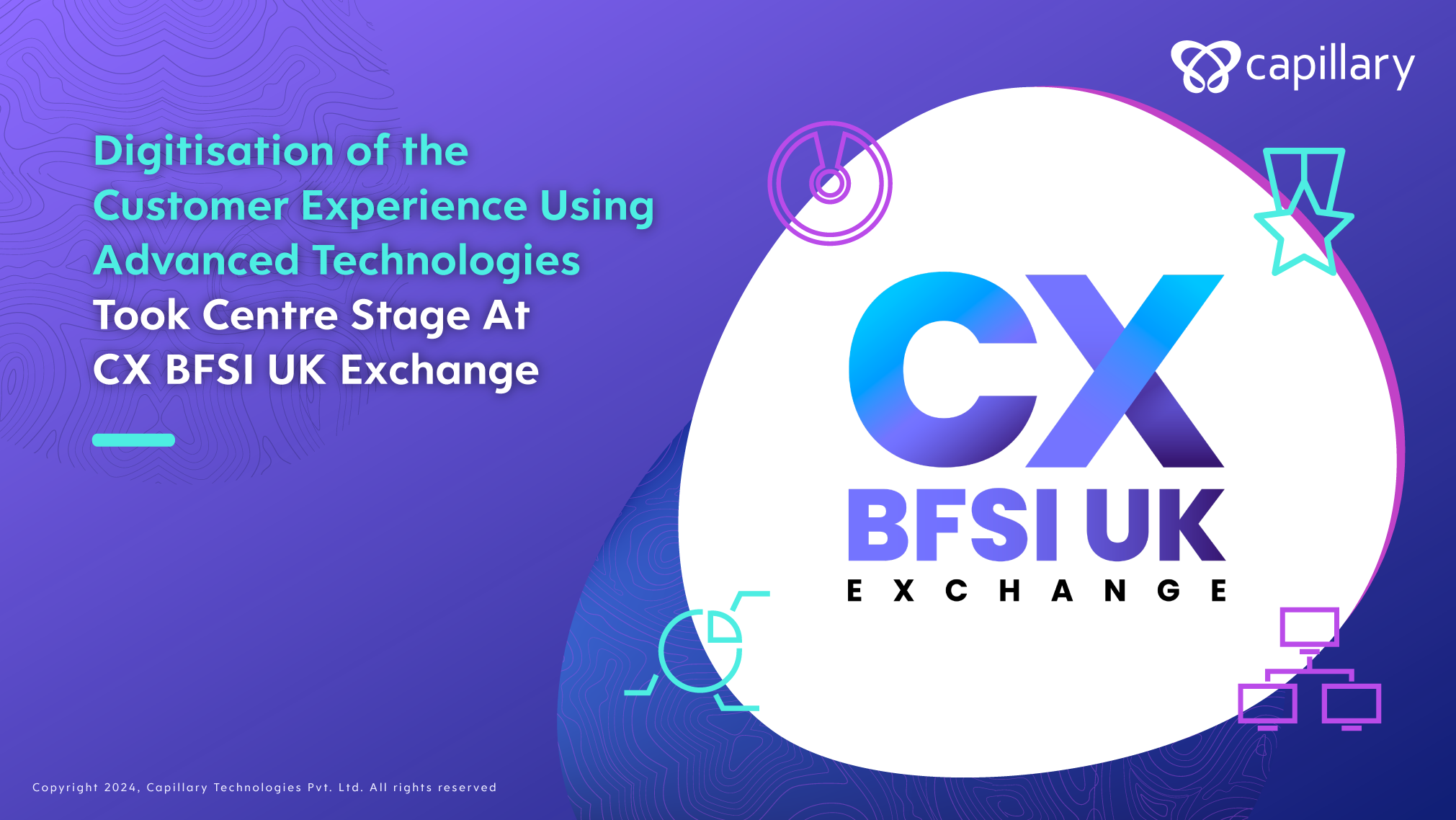- Design industry shaping loyalty programs
- Integrate easily and go live quicker
- Deliver hyper-personalized consumer experiences
Blue Rewards from Al Futtaim Group Shares Loyalty Success Stories and Evolution. Watch Podcast >
Capillary Announces 2nd Annual Captivate 2025 Summit: Transforming Loyalty Management with New AI Tech Read more >

Our European team attended the CX BFSI UK Exchange in London earlier this month and it was a packed two-day summit with thought-provoking discussions and valuable insights. Throughout the event, some key themes emerged that gave us real food for thought. There’s no doubt that In today’s financial climate, securing budgets for Customer Experience (CX) initiatives can feel like an uphill battle, with the demand for operational efficiency and cost reduction often overshadowing the potential for incremental gains and profitability, particularly in the consumer banking sector. Many banks have tried to improve the customer experience through incentives and rewards, without success. These experiences, lacking a personalised touch within a curated environment, have failed to drive high levels of engagement with the banks digital assets, resulting in little appetite to focus on investment in this area, despite the potential to reduce cost-to-contact ratio by incentivising customers to move to these channels and increase self-service.
As we engaged with the sessions, it became evident that daily banking, often viewed as a loss-leader, holds the key to unlocking an engaged, loyal customer base who provide opportunity to consume a wider range of more profitable financial products. The potential to deliver intelligent, real-time product up-sell and cross-sell opportunities within the banking experience through effective digitisation, incentive & reward can be the new reality. Imagine personalised product recommendations based on a customer’s balance fluctuations, loan behaviour, and mortgage activity? With advances in technology and open banking capabilities, building a true understanding of a customer and determining their value to the bank is achievable without a huge amount of effort, using the right partner.
Recognising that investment in customer experience is not simply an expense, but a cornerstone for building enduring customer relationships that are mutually beneficial, fostering loyalty, delivering value and achieving differentiation within this increasingly competitive marketplace, is paramount. The relentless focus on cost reduction, while understandable and often a necessity, can obscure the potential for the significant gains available to those forward-thinking organisations who build customer-centric strategies focused on digitisation that drive operational efficiency while offering incentive to change customer behaviour. The majority of banks find themselves at a crossroads, navigating a tightrope between immediate financial objectives and the long-term imperative of building stronger customer connections.
Banking institutions that have experimented with rewards programs frequently encounter a common obstacle: a lack of meaningful engagement from their consumers. This challenge stems from the generic “one size fits all” nature of the rewards and incentives, where customers are sent impersonal offers that fail to resonate with their individual needs, preferences, and behaviours. Without this personalised touch, any reward loses its effectiveness and fails to capture customer attention or loyalty, and can oftentimes lead to dissatisfaction and lower CSAT scores. Despite good intentions, oftentimes banks struggle to achieve the desired level of participation and engagement within their rewards programs, which is surprising when you consider just how much relevant information they have on each individual customer. The key takeaway here is the importance of utilising that data to curate and tailor rewards and incentives to each customer’s unique profile, creating an experience that delivers genuine value and fosters engagement.
As we came to the last few sessions at the CX Exchange, it became clear that everyday banking, while traditionally viewed as a loss leader, is actually a hidden gem within the financial landscape, serving as a gateway to establishing authentic relationships with customers, and paving the way for deeper engagement with a wider prospect pool to consume more profitable financial products and services. Understanding the value of each individual customer, building and segmenting those customers based on that value is where the real innovation lies, using intelligent algorithms and data-driven insights that draw on the pool of existing information many banks hold, to drive profitability and redefine the boundaries for up-selling and cross-selling across their product portfolio. By leveraging technology and advanced analytics, recommendations can be meticulously tailored to each individual’s financial behaviour. This paradigm shift presents a monumental opportunity for financial institutions to not only meet but exceed customer expectations, ultimately fostering deeper trust and loyalty while driving growth, and improving operational efficiency through digitisation.
Capillary’s comprehensive suite of products and services empowers banks and financial service providers with cutting-edge tools to manage customer engagement, automation, incentive & reward management. We help our clients realise the potential of digitisation in driving operational efficiency through the creation of truly personalised incentive and reward programs that help build meaningful, profitable relationships with their customers. If we didn’t manage to connect with you at the event, please do not hesitate to reach out to the team to learn more about how we can empower your teams to unlock the full potential of customer-centric experiences that change behaviour and deliver business outcomes.
Digitisation in the BFSI (Banking, Financial Services, and Insurance) sector offers several key benefits, including improved customer experience, enhanced operational efficiency, and increased security. By leveraging digital solutions, banks and financial institutions can streamline processes, reduce costs, and provide personalized services to customers. This transformation is crucial for staying competitive in the UK market and meeting the evolving demands of tech-savvy consumers.
Digital customer experience solutions can significantly improve banking services in the UK by providing seamless and personalized customer interactions. These solutions enable banks to offer 24/7 service through multiple channels, including mobile apps and online platforms. Additionally, they help gather and analyze customer data to deliver targeted services and offers, enhancing customer satisfaction and loyalty.
The latest trends in digitization for the BFSI industry in the UK include adopting artificial intelligence and machine learning for predictive analytics, using blockchain technology for secure transactions, and implementing omnichannel customer engagement strategies. These trends drive innovation and enable financial institutions to offer more efficient and secure services to their clients.
UK banks can leverage AI to enhance customer experience by using chatbots and virtual assistants for instant customer support, implementing AI-driven personalization to offer tailored products and services, and utilizing predictive analytics to anticipate customer needs and provide proactive solutions. AI technology helps reduce response times, improve service quality, and increase customer engagement.
Digital transformation plays a critical role in the competitiveness of BFSI firms in the UK by enabling them to innovate, optimize operations, and meet customer expectations. By adopting digital technologies, BFSI firms can offer faster, more reliable services, reduce operational costs, and stay ahead of regulatory changes. This transformation is essential for maintaining a competitive edge in a rapidly evolving financial landscape.

June 9, 2021 | 4 Min Read
When the pandemic began, the immediate customer trends showe

February 25, 2014 | 4 Min Read
Superstores are a complex set of stores to operate; they are

February 4, 2014 | 4 Min Read
We’ve entered the age of the consumer, where the customer